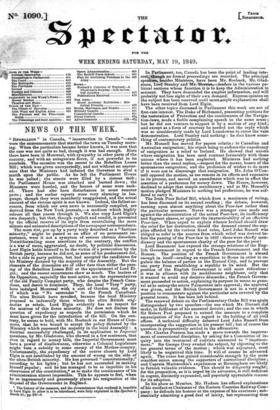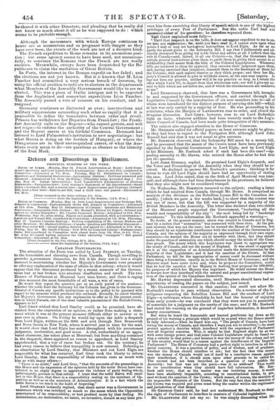In Parliament, too, Canada has been the point of leading
inte- rest,^4bough no formal proceedings are recorded. The principal speakesa, besides Ministers have been Mr. Roebuck, Mr. Glad-
stone, Lord Stanley and Air. Herriea,—leaders in the various po- litical sections whose function it is to keep the Administration to account. They have demanded the amplest information, and will
probably not lose sight of their own demand: Express opinion on the subject has been reserved until more.ample explanations shall have been received from Lord Elgin.
The other topics discussed in Parliament this week are not of first-rate interest. The Duke of Richmond, presenting petitions for
the restoration of Protection and the continuance of the Naviga- tion-laws, made a feeble complaining speech in the same sense ; but he did not venture to support it by a motion of any kind;
and except as a form of courtesy he needed not the reply which was so considerately made by Lord Lansdowne to cover the vain demonstration. Lord Stanley said nothing : be does know some- thing of contemporary politics. Mr. Monsell has moved for papers relatin r to Canadian and Australian emigration • his object being to enforce the expediency of emigration as a relief to Ireland. He showed that unions where emigration has been used contrast favourably with those unions where it has been neglected. Ministers had nothing better than the usual replies,—respect for the mover, boasts of the spontaneous emigration, and the profession of wishes to do more if it were not to discourage that emigration. Mr. John O'Con- nell opposed the motion, as too remote in its effects and expensive in its process, and moved an amendment which was in effect the assertion of a preference for money down. The House, however, declined to adopt that simple mendicancy ; and as Mr. Monsell's motion pledged Ministers to nothing but professions, he was suf- fered to carry it.
The Irish Poor Relief Bill, which fixes a maximum of rating, has been discussed on its second reading • the debate, however, turning upon almost anything about the Poor-law rather than the particular measure. Never was a stronger case made out against the administration of the actual Poor-law, its inefficiency and flagrant abuses, or against the impracticability of an effective Poor-law. When urged to explain whence Ireland should draw the relief for her destitution, should the demand exceed the sup- plies afforded by the various fixed rates, Lord John Russell was obliged to refer to the sources from which relief was derived be- fore the passing of the Poor-law in 1837: those were chiefly men- dicancy and the spontaneous charity of the poor for the poor I
Lord Beaumont has exposed the strange relations of the Eng- lish Government in regard to the French Government and the Roman. The position of the French Government is absurd enough in itself—sending an expedition to Rome in order to re- gulate the balance of parties in the Eternal City, and to prevent one party from establishing a republic to its mind. But the position of the English Government is still more ridiculous : it was in alliance with its meddlesome neighbour, only that it wanted to avoid any decisive demarche ; the French Govern- ment proceeded to action, explaining its purpose in terms so gene- ral as to entrap the astute Palmerston into approval; the approval was given, and the British Government is not in a very good position to remonstrate against the particular acts covered by the general terms. It has been left behind.
The renewed debate on the Parliamentary Oaths Bill was again distinguished by two speeches—the one which Mr. Disraeli did make, in fulfilment of his ancestral devoirs; and the one in which Sir Robert Peel proposed to extend the measure to a complete emancipation of the Jews in regard to the bolding of all civil offices. A technical difficulty debarred Lord John Russell from incorporating the suggestion in his present bill ; but of course the question is prospectively settled in the affirmative. Mr. Charles Pearson has made a move towards the improve- ment of correctional discipline, by asking for a Committee of in- quiry into the treatment of convicts sentenced to "imprison- ment." Sir George Grey evaded the subject, by objecting to the too general terms of the motion ; which was adjourned, most likely to be negatived this time. It will of course be advanced again. The cause has gained considerable strength by the more manifest union among the supporters of correctional discipline; and Captain Macbnochie's experiences at Birmingham are likely to furnish valuable evidence. This should be diligently sought ; for the proposition as it is urged by its advocates, is still deficient in cogent, distinctly y expounde°d, and popularly appreciable reasons for its adoption.
In his place as Member, Mr. Hudson has offered explanations of his conduct as Chairman of the Eastern Counties Railway Com- pany: be defends his honour at the expense of his exactness; sub- stantially admitting a good deal of laxity, but representing that
he shared it with other Directors, and pleading that he really did not know so much about.it all as he was supposed to.do : which seems to be probableenough.



























